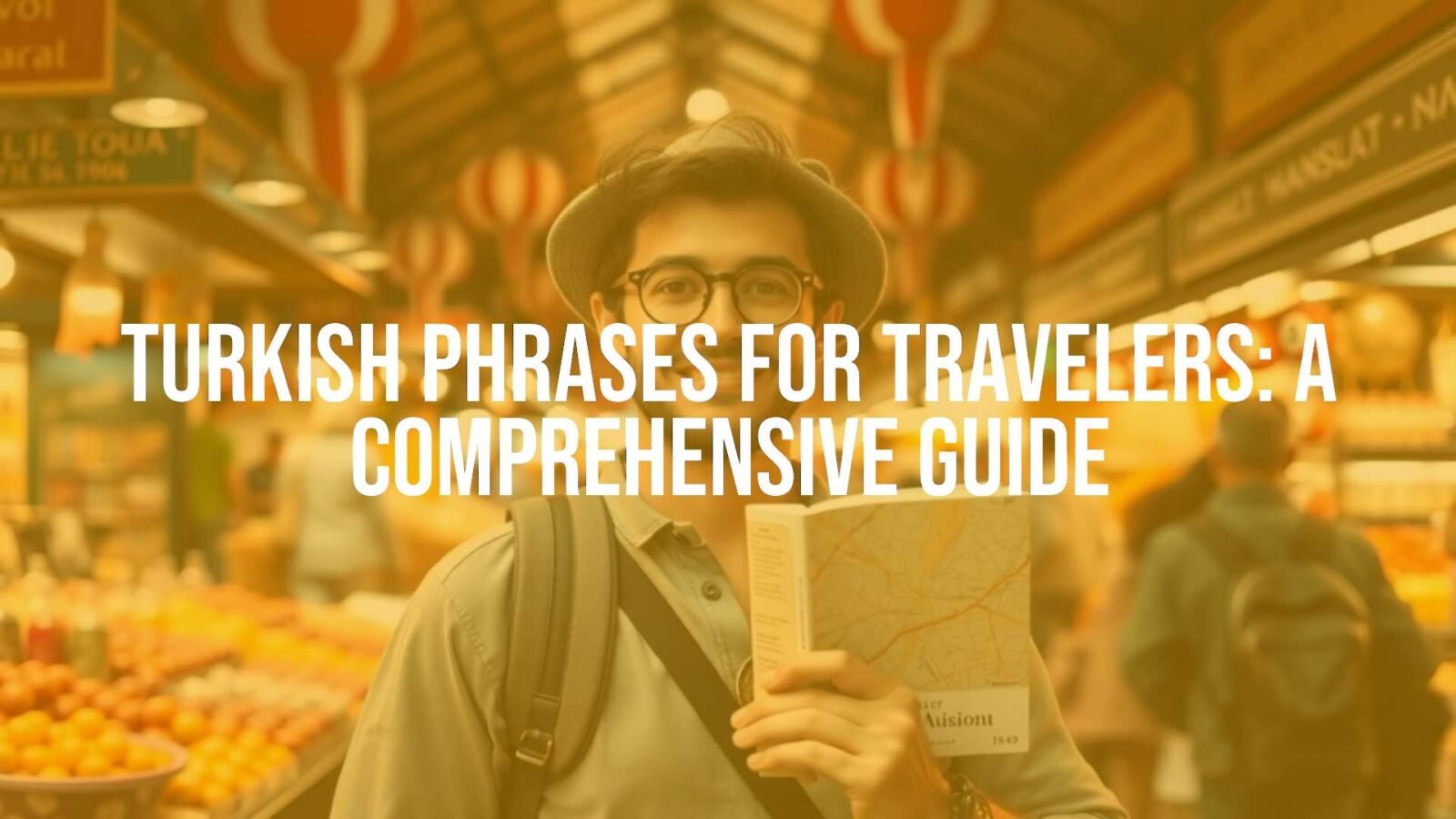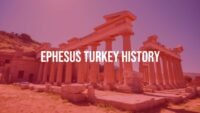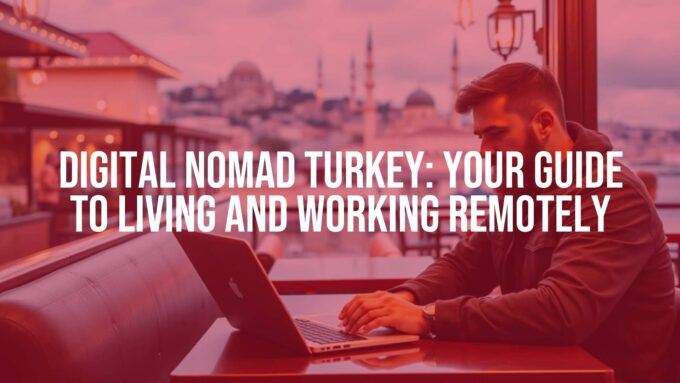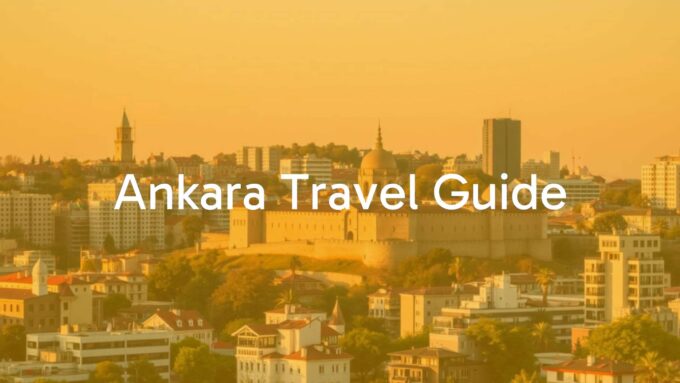Planning a trip to Turkey promises excitement, full of amazing history, beautiful places, and lively culture. But how can you better enjoy your time there? The answer is to pick up a few Turkish phrases. Even though many people in tourist spots and big cities like Istanbul speak English, showing that you’ve tried to learn some Turkish means a lot. It isn’t just about making things easier for yourself-using a little Turkish is a way to show respect and helps you connect more with locals. Knowing some basic Turkish will help you in everyday moments, like ordering food or asking for directions. Plus, it’s sure to make you more welcome with Turkish people, who are famous for being friendly. Here are key phrases and tips to help make your visit special!

How Learning Turkish Can Help Travelers
Trying to speak the local language makes your trip more fun and helps you mix with the people better. In Turkey, even saying a simple “hello” in Turkish shows you care, and it often means people will treat you with extra kindness. Your meetings become more friendly and personal, and you might get helpful suggestions or small gifts from locals. Starting a chat in Turkish can turn a basic interaction into a genuine connection.
How Turkish People React to Travelers Speaking Turkish
If you try speaking Turkish, you may be surprised by the positive reaction. Turks value politeness and hospitality, which they call misafirperverlik. Using their language, even if only a few words, tells locals you respect them. This can lead to a warmer welcome, friendly conversation, and sometimes extra help. You may even be treated like you’re part of the family. Using Turkish makes your trip feel much more personal.

Using Turkish in Tourist vs. Non-Tourist Areas
English is common in big tourist cities and along the coast, but once you travel beyond these places, Turkish becomes much more important. In small towns and villages, you may not find English speakers, so using Turkish helps you get what you need and builds real connections. Even in busy places, speaking Turkish can help you make friends or get better service, and things like shopping or taking public transport become simpler.
Greetings and Introducing Yourself
Polite greetings mean a lot in Turkey. Start every talk with something friendly. Knowing these simple phrases helps you make a good impression right from the start.
| English | Turkish | Pronunciation |
|---|---|---|
| Hello | Merhaba | Meh-rha-bah |
| Good morning | Günaydın | Goo-nye-din |
| Good evening | İyi akşamlar | Ee-ak-sham-lar |
| Hi | Selam | Seh-lam |
Another common greeting is the Arabic-inspired Selâmünaleyküm (“Peace be upon you”), answered with Aleykümselâm (“And peace be upon you”).
Introducing Yourself
- My name is… = Benim adım… (“ben-im ad-um”)
- What’s your name? (informal) = Senin adın ne?
- What’s your name? (formal) = Sizin adınız ne?
- Nice to meet you = Memnun oldum
- Welcome = Hoş geldiniz
- Response to Welcome = Hoş bulduk
Saying Goodbye
| Situation | Phrase | Pronunciation |
|---|---|---|
| You are leaving (to one person) | Hoşça kal | Hosh-cha-kal |
| You are leaving (to many or formal) | Hoşça kalın | Hosh-cha-ka-lin |
| They are leaving (you are staying) | Güle güle | Goo-lay goo-lay |
| See you later | Görüşürüz | Goo-roosh-oo-rooz |

Politeness and Good Manners
Being polite is very important in Turkey. Simple words like “please” and “thank you” are used often, and adding respect titles makes your speech warmer and more proper.
- Please: Lütfen (“Loot-fen”)
- Thank you: Teşekkür ederim (“Tesh-ek-kur ed-air-im”)
- Thanks: Teşekkürler or Sağ ol (“sa ol”, informal)
- You’re welcome: Bir şey değil (“beer shey deh-yeel”)
For adults, use Bey for men and Hanım for women after their first name (e.g., Mustafa Bey, Zeynep Hanım).
Making Small Talk
Having friendly conversations is common in Turkey and helps you make friends easily.
Useful Phrases
- May your work be easy: Kolay gelsin (“ko-lie gel-sin”)
- How’s it going? Nasıl gidiyor? (“na-sil gid-ee-your”)
- What’s up? Ne haber? (“nay-hah-bear”)
- How are you? Nasılsın? (informal); Nasılsınız? (formal)
- I’m fine, thank you. And you? İyiyim, teşekkür ederim, ya siz?
You may be asked about your hometown: Memleketiniz nerede? (“Where is your hometown?”) or Nerelisin? (“Where are you from?”). Reply with Ben…lıyım (“I’m … [your country’s name]-an”).
Question Words
Asking questions is a key part of discovering new places. Here are some important Turkish question words:
| English | Turkish | Pronunciation |
|---|---|---|
| What? | Ne? | Neh |
| Who? | Kim? | Keem |
| When? | Ne zaman? | Neh za-man |
| At what time? | Kaçta? | Katch-ta |
| Where? | Nerede? | Nair-e-day |
| How? | Nasıl? | Nah-suhl |
| Why? | Neden? / Niye? / Niçin? | Nay-den / Knee-ay / Knee-chin |
| How much? | Ne kadar? | Neh ka-dar |
| How many? | Kaç tane? | Katch ta-neh |
Getting Help and Emergencies
It’s smart to be ready for situations where you need help. Turkish people are usually very helpful, especially when you use these phrases:
- Excuse me: Bakar mısın? (“ba-kar mi-sin”), Affedersiniz (“af-ed-air-sin”), Pardon
- Can you help me? Bana yardım eder misin? (informal) / Bana yardım edebilir misiniz? (formal)
- I’m lost: Kayboldum
- I don’t understand: Anlamıyorum
- Help! (emergency): İmdat! (“eem-dot!”)
- Where are the police?: Polis nerede?
- Where is the hospital?: Hastane nerede?
- Call an ambulance: Ambulans çağırın
- I am allergic to…: Benim …e alerjim var
Travel and Getting Around
Getting from place to place is easier with these transportation words and phrases:
- Where is…? [Place] nerede?
- Straight: Düz
- Left: Sol
- Right: Sağ
- Close/Far: Yakın/Uzak
- Is it open?: Açık mı?
- Is it closed?: Kapalı mı?
Transit Terms
- Taxi: Taksi
- Where can I find a taxi?: Taksi nereden bulabilirim?
- Bus: Otobüs
- Shared minibus: Dolmuş (“Dol-mush”)
- Metro: Metro

- Which bus stops here?: Hangi otobüs buradan geçiyor?
- I want to buy a ticket: Bilet almak istiyorum
- I want to go to…: [Place]’a gitmek istiyorum
- May I have directions?: Bana yol tarif eder misiniz?
- How can I go to [Place]?: Pardon, [Place]’ya nasıl gidebilirim?
Ordering Food
Turkish food is delicious and ordering is easy if you know what to say. Use these phrases:
- A table for two, please: İki kişilik bir masa
- Menu, please: Menüyü görebilir miyim?
- May I have [item], please?: [Item] alabilir miyim lütfen?
- The bill, please: Hesap lütfen!
- Enjoy your meal: Afiyet olsun
- Reply to ‘Afiyet olsun’: Teşekkürler (“Thanks”)
- Compliment to chef: Elinize sağlık

Diet and Allergy Phrases
- I’m vegetarian: Vejetaryenim
- I don’t eat cheese: Peynir yemem
- I have a nut allergy: Fındık alerjim var
Shopping and Bargaining
Shopping, especially in markets, is a big part of Turkey. Here are handy phrases:
- I want this please: Bunu istiyorum lütfen
- How much?: Ne kadar?
- How much is this?: Bu ne kadar?
- What size is this?: Bu kaç beden?
- Can I pay by credit card?: Kredi kartı ile ödeyebilir miyim?

For bargaining:
- Expensive: Pahalı
- Cheap: Ucuz
- Very: Çok
- A little: Biraz
Fun and Memorable Turkish Sayings
Using fun or special Turkish sayings can make locals smile and help you stand out.
- Bless you (after sneezing): Çok yaşa!
- Reply: Size de / Hep beraber
- Patience proverb: Damlaya damlaya göl olur (“Drop by drop, a lake forms.”)
- To annoy by talking too much: Kafa ütülemek (“To iron one’s head”)
- Congrats or good news: Gözünüz aydın (“May your eyes be bright”)
- Wishing a good journey: Yolun açık olsun (“Have a smooth trip”)
Frequently Asked Questions
What is a Common Turkish Greeting?
- Merhaba (“Hello”) works for everyone and every occasion.
- Selam is used informally with friends or young people.
- For “Good morning,” use Günaydın and for “Good evening,” İyi akşamlar.
How Should I Show Respect in Turkish?
- Say Lütfen (“Please”) and Teşekkür ederim (“Thank you”) often.
- Use Bey for men, Hanım for women after their first names.
- If you’re unsure, speak formally, using Siz (formal “you”).
- For workers, say Kolay gelsin as a kind gesture.
Which Phrases Are Most Useful for Tourists?
- Greetings: Merhaba, Günaydın, İyi akşamlar, Selam
- Polite words: Lütfen, Teşekkür ederim
- Yes/No: Evet / Hayır
- How much?: Ne kadar?
- The bill please: Hesap lütfen!
- Where?: Nerede?
- Do you speak English?: İngilizce konuşuyor musunuz?
- I don’t understand: Anlamıyorum
With these basics, you can handle most situations you’ll face in Turkey, from ordering food to finding your way. Using Turkish shows politeness and helps you enjoy your stay even more.
















Leave a comment